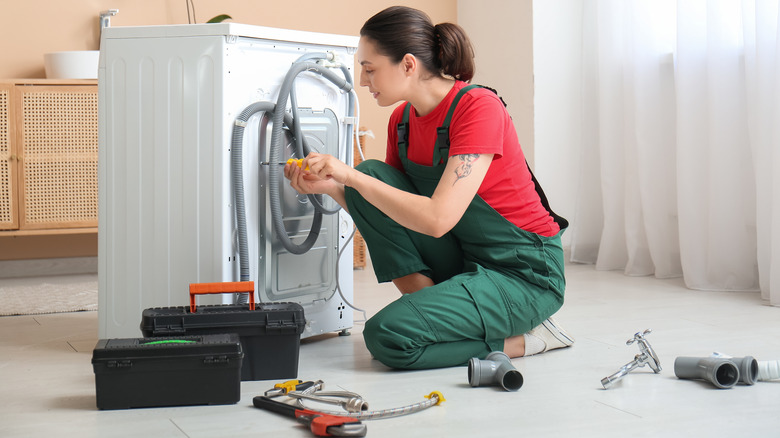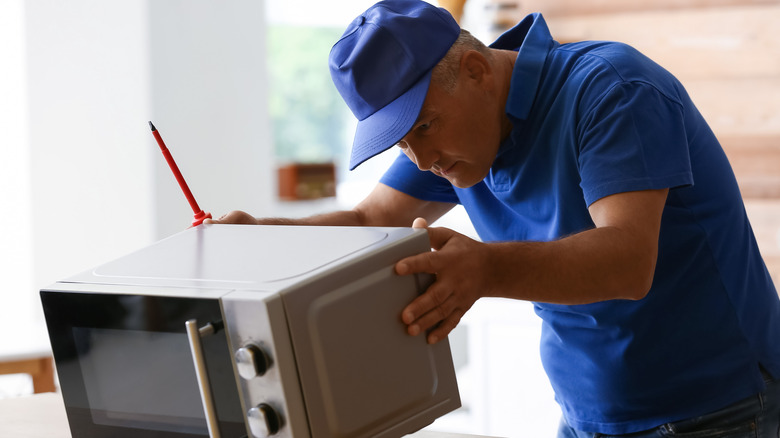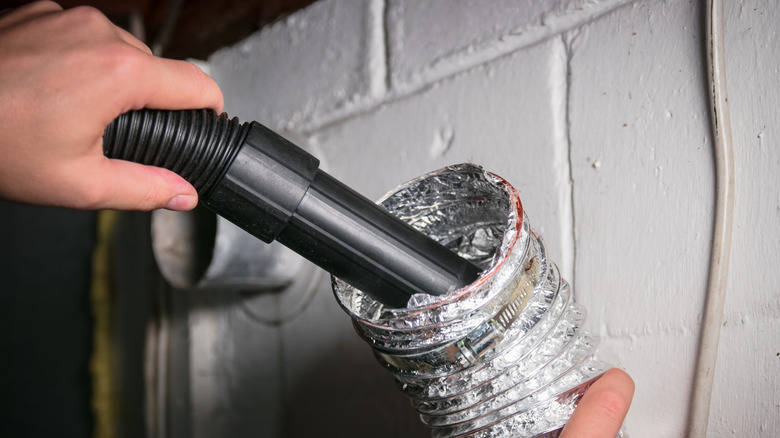Household Appliances That Are Most Likely To Break Down (And How To Avoid It)
We may receive a commission on purchases made from links.
From the kitchen to the laundry room, household appliances greatly simplify our lives. Whether they're cleaning our dishes, helping us prepare meals, keeping our perishable food safe, or making the task of laundering clothes less daunting, it's hard to imagine life without them. That is until you're forced to when one breaks down. That's when you really appreciate how much easier they make your life. However, being without one of these workhorses that you rely so heavily on is frustrating. At best, it can leave you scrambling to pay for expensive appliance part replacements and learning to fix it. At worst, you'll have to face the costs of having a new appliance installed if yours can't be fixed.
Unfortunately, some appliances are simply more likely to break down than others (you may have first-hand experience with this, even). Wouldn't it be nice to understand what you could do to help prevent this frustration and save yourself from dropping a lot of money on a repair or a replacement? We thought so too, so we reached out exclusively to several appliance experts to learn more. They explained which household appliances are the most likely to break down, and what can be done to try to prevent them from doing so.
Washing machines are one of the most likely appliances to have an issue
Washing machines are used regularly in many households. From cleaning multiple loads of whites, darks, jeans, and delicates, to washing towels, bedding, and other linens, there are some days that it feels like the washer is constantly going. Samantha Walsh, an expert at Sears Home Services, tells House Digest that this frequent use contributes to them being one of the most likely appliances to require repair or replacement. "We often overload our washers. Washing that king-size comforter or that load of 20 heavy bath towels takes its toll on the motor, belt, bearings, and other drive system parts," Walsh explained during an interview with House Digest. Frequent use, however, isn't the only contributing factor to more frequent breakdowns. As you know, washing machines clean using water. So much water exposure can wear down the gaskets and seals over time, resulting in leaks, explains Walsh. Plus, if the machine isn't cleaned properly and regularly, the corrosion will become a problem sooner than it may have otherwise.
While washing machines may be more likely to break down, it isn't a foregone conclusion that yours will, especially if you use it correctly and follow basic maintenance steps. To avoid the dangers of overloading your washing machine, Walsh says to consult the owner's manual regarding acceptable load sizes. She cautions against using too much laundry detergent and to be sure to use an HE detergent, such as Tide Free & Gentle Liquid Laundry Detergent, for any high-efficiency machines. According to Walsh, regular washing machine cleaning (about once per month using a product like Affresh Washing Machine Cleaner) is also important to prevent residue from the detergent from accumulating inside the unit. She also highlights the benefits of hiring a professional technician to service the unit each year to prevent small issues from turning into larger problems.
Dishwashers are used heavily and often exposed to hard water, which can cause problems
The dishwasher is another appliance that most of us rely heavily on. And, unfortunately, it too is another one that breaks down more frequently. As with washing machines, Walsh explains, "Frequent exposure to water often takes a toll on dishwashers. Hard water and detergent flowing through the spray arms and filters eventually clogs these parts if you don't clean the dishwasher regularly." If the spray arms are clogged, the appliance won't work properly. These arms have the important job of making sure that water reaches all the parts of the machine's interior. If they can't work as they should, it can result in your dishes not coming out fully clean or rinsed.
To decrease the likelihood that you'll be facing an issue with your dishwasher, Walsh stresses the importance of regular cleaning. She says, "Use a dishwasher cleaner monthly to help keep the spray arms and filter screens clear so the dishwasher works efficiently." These products, such as the Cascade Platinum Dishwasher Cleaner, make it easy to maintain the unit. You simply need to put the tablet in the empty machine and run a cleaning cycle. Walsh also explains that it is important to know how to clean your dishwasher filter, rinsing its screen once per month. Additionally, she notes that using a bamboo skewer, such as one of the Good Cook skewers, can help remove debris that's clogging the holes in the spray arms.
Internal issues with microwaves often prevent them from functioning properly
Being able to pop some leftovers or a bowl of soup into the microwave, waiting a few minutes, and having a hot meal ready to enjoy certainly is convenient. So, if the microwave breaks down, it can be a real hassle. And, according to Walsh, microwaves are another home appliance that many people have problems with. She explains, "The high current and voltage flowing through this appliance sometimes leads to internal failures of the high-voltage capacitor, diode, magnetron, and control board." Other issues with fuses and other internal safety mechanisms can also prevent proper functioning and may result in a broken-down unit. While you may be able to tinker around with a broken washing machine or dishwasher, trying to fix a microwave on your own without proper training can be dangerous, according to Walsh. While some small repairs may be worth paying to fix, she notes that often it simply makes the most financial sense to purchase an entirely new microwave (especially if you have a countertop model).
While buying a new microwave might prove to be less expensive than paying for a complex repair, an even cheaper option would be to minimize the need for any repairs or replacements. According to Walsh, avoiding some common mistakes people make with their microwaves can help achieve this goal. She says, "To help prevent microwave breakdowns, use a food cover to prevent splatters. Clean food residue and splatters from the inside of the microwave cavity often to prevent arcing and burn marks inside the microwave." So, keep a set of Tovolo Microwave Splatter Covers in a convenient spot for reheating food. And make wiping down the unit with a product like Weiman's Glass Cooktop and Microwave Wipes part of your regular kitchen cleaning routine.
Improper maintenance can lead to dryers breaking down more often than they otherwise would
The washing machine isn't the only laundry appliance that sees frequent use. Unfortunately, it also isn't the only laundry appliance that is prone to frequent issues, either. During an exclusive interview with House Digest, Jimmy Hiller, the CEO and president of Happy Hiller, explained to House Digest that many dryers end up needing repairs within five years. He says that the reason for this isn't because of the quality of their construction, but because homeowners don't properly care for and maintain their appliances and keep them free of lint build-up. Otherwise, the heated air can't flow properly and can lead to the unit overheating.
There are two key maintenance tasks that Hiller highlights as essential in helping your dryer function properly. He says, "Cleaning the lint trap before every load and deep cleaning the vent once a year is all it takes to prevent breakdowns and help your dryer last 10 years and more." A tool like Holikme's Dryer Vent Cleaner Kit can help you reach deep into crevices and thoroughly remove build-up from ducts.
One other key thing you can do to lengthen the lifespan of the appliance is to wipe out the inside of the drum periodically to remove any residues. Additionally, just as it is important not to overload the washer, it is also important to make sure you aren't cramming too many clothes or linens into your dryer. This will ensure that there is adequate air circulation to keep the unit functioning properly.
There are various issues that may put a fridge on the fritz
When your fridge breaks down, it can really complicate your life. While you may be able to hand-wash dishes for a few days or put off washing a few loads of laundry, going without a fridge, even for a short period of time, is a different story. Unfortunately, the fridge is also one of the household appliances that is most likely to break down. So, you might have already faced the challenging and frustrating experience of not being able to keep perishable foods safe. By the time you realize that there is a problem, it may be too late to fix it. For example, according to what Ian Palmer-Smith, an appliance repair expert at Domestic & General, tells House Digest, "If you notice an unusual amount of condensation on the outside of your fridge or around the edges of the door, this might indicate that your appliance is not cooling properly, and needs to be replaced,"
To prevent things from getting to the stage that buying a new fridge is the only viable solution, appliance technician and licensed electrician David Miloshev with Fantastic Services, identifies some of the common reasons why a refrigerator will stop working, and what you can do to avoid them. He explains to House Digest that dust and hair often clog the condenser coils. Scheduling time to vacuum these coils about twice a year (particularly in older models with exposed coils) can prevent clogs from causing the compressor to overheat. Additionally, Miloshev shares, "The door seals can also wear out, making the motor work overtime." Because of this, it is more important than you probably realized to keep the door seals cleaned and to check that they are still functioning properly. "You can do that by putting a bill in the door and if it slips out easily, the seal needs replacing," says Miloshev. Luckily, swapping out this gasket is a pretty budget-friendly project. Replacements often cost less than $100, a small price to pay to keep your fridge in good working order.





